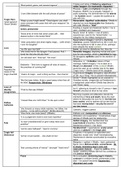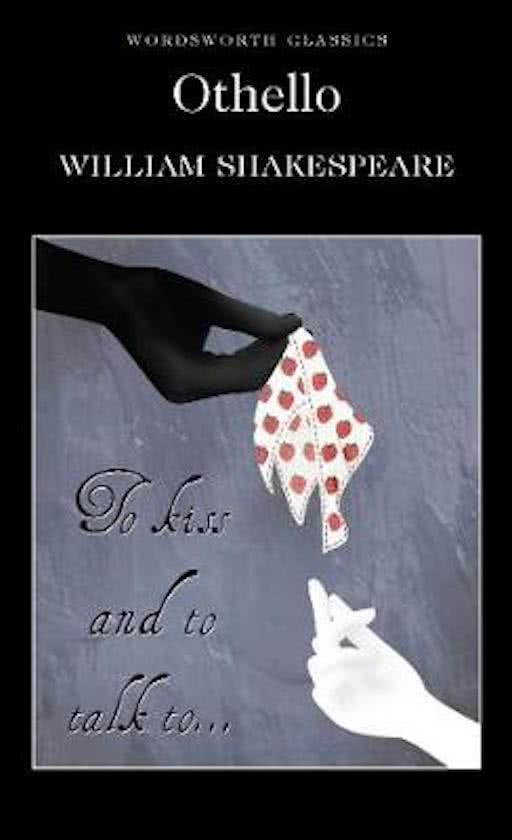Tripling and listing of flattering adjectives =
“Most potent, grave, and revered signors”
noble, elegant, well mannered, respectful
Plosives = calm and rhythmic through the
fricatives, IRONY, he is actually “blessed” in
“(I am) little blessed with the soft phrase of peace” public speaking. His diminishment of his talents
– his humble nature – causes the audience to
side with him
Tragic Hero
“Keep up your bright sword” “Good signior, you shall Honourable, dignified, authoritative. Othello is
“great general”
more command with years that with your weapons” (to depicted as more honourable than Brabantio,
“brave Othello”
Brabantio) who calls Othello a “thief”
Exuding a regular and balanced rhythm = he is
Iambic pentameter
calm, confident and measured
Nouns “arms” & “action = man of action,
“these arms of mine had seven years pith… their
experienced, used to the “tented fields” = a
deerest action in the tented fields”
metaphor for his military background
Supernatural imagery highlights charming
“what conjuration and what mighty magic… (with which) charisma, causes Desdemona to fall in love, but
I won his daughter” also the audience to fall in awe of him, perhaps
even despite the racist context
Love
“my life upon her faith” Ironic, as once he disbelieves her, they die
“she loved me for the dangers I had passed. And I Romantic imagery, depicting mutual and pure
loved her that she did pity them” love for one another, which is tarnished by Iago
All derogatory epithets used for the derision of
“an old black ram” “thick lips” “the moor”
Othello
Alliterative ‘a’ = forbidden nature of their
marriage, hellish imagery = he is seen as a
Brabantio - “(this love is) against all rules of nature…
threat and alienated. In this context Othello
Outsider the practices of cunning hell”
would be seen as an outsider due to his race.
Arguably the
Tragic irony = Othello does kill his daughter
cause of his
Supernatural imagery derogatory objectification
tragic downfall “chains of magic…such a thing as thou…foul charms”
of Oth. as a “thing” =he is outsider+disrespected
Simile = Othello highlighted as an outsider to
“like the base Indian, threw a pearl away richer than all Venetian society, anagnorisis as Desdemona is
his tribe” Anagnorisis / Blindness a metaphoric pearl which Othello was blind to
and “threw” away
Loss of
Act 5, referring to himself in the 3rd person = lost
identity “That he that was Othello”
himself, shocked at what he has done
Anagnorisis
Rhyming couplets and alliteration denote the
intertwining of love and death. Since the start
where he advocated his love for D, his fate has
“I kissed thee ere I kill’d thee” “to die upon a kiss”
been sealed, and he realises all too late that he
Pathos
has been manipulated – we pity the end of
Catharsis
our two lovers
“she forsook so many noble matches, her father, her
Cathartic, triggers pathos
country… to be call’d a whore?” (Emilia about D)
“One more, one more (kiss)!” (Othello) Pathetic end, manipulated and oblivious
Alliteration and superlative = foreshadows tragic
“it is a judgement maim’d and most imperfect”
demise of Othello and his relationship
Hellish imagery, the handkerchief has
“to lose’t (handkerchief) or give’t away were such
Fate supernatural properties, the fact that
perdition”
Desdemona loses it = her doom
Handkerchief = supernatural, ocular proof,
“worms were hallowed”, “dyed in mummy”
used as a catalyst in the tragic plot
Tragic fall Fricatives = his speech is malevolent and
Dishonour disjointed, modal verb “shall” foreshadowing
“let her rot and perish… she shall not live”
Desdemona’s demise accentuated by evocative
verbs
Metaphor + epithet = Othello - hard, patriarchal
figure. He is dishonourable, uncourteous. He
is slowly mimicking Iago’s sick and
“that cunning whore of Venice” “strumpet” “lewd minx!”
malevolent rhetoric – triggering pathos of the
reader, watching Othello fall from his confidence
into jealous despair
Prose He is corrupted, mimicking Iago’s rhetoric,
contrast to confident iambic pentameter at the
start – his speech becomes fragmented,
disjointed and crude





